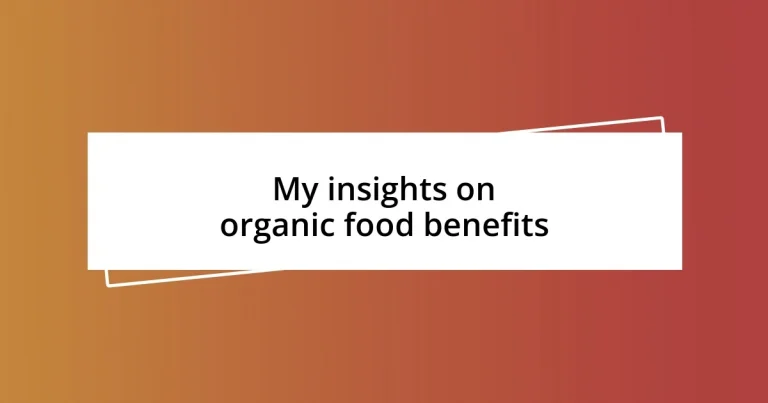Key takeaways:
- Organic food offers health benefits such as higher antioxidant levels, better nutrient concentration, and reduced pesticide exposure, contributing to overall well-being.
- Supporting organic farming practices enhances soil health, promotes biodiversity, and reduces water pollution, positively impacting the environment.
- Choosing organic involves understanding labels, prioritizing local produce, and mindful purchasing habits, fostering a connection to food and community.
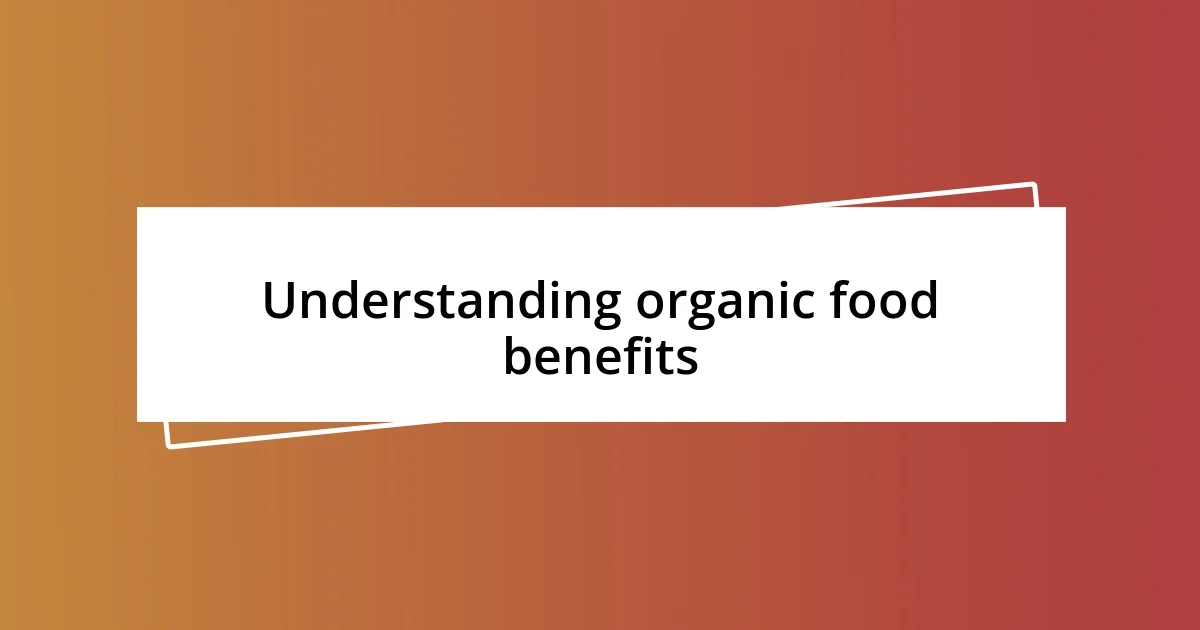
Understanding organic food benefits
When I first switched to organic food, I noticed a remarkable difference in how I felt. I remember biting into a fresh organic apple, and it tasted like a burst of real flavor compared to the conventional ones I used to eat. This raises a question: isn’t it fascinating how food can be so much more than just nourishment?
One of the core benefits of organic food is the absence of synthetic pesticides and herbicides. Personally, I find comfort in knowing that I’m choosing products that are less likely to contain harmful chemicals. It’s a small but powerful act of self-care, and it makes me wonder—how often do we think about what’s really in our food?
Additionally, organic farming practices strive to promote biodiversity and environmental health. This means that by choosing organic, I feel like I’m supporting a system that respects the planet. Have you ever considered how our food choices impact the world around us? It certainly adds a layer of importance to every meal I enjoy.
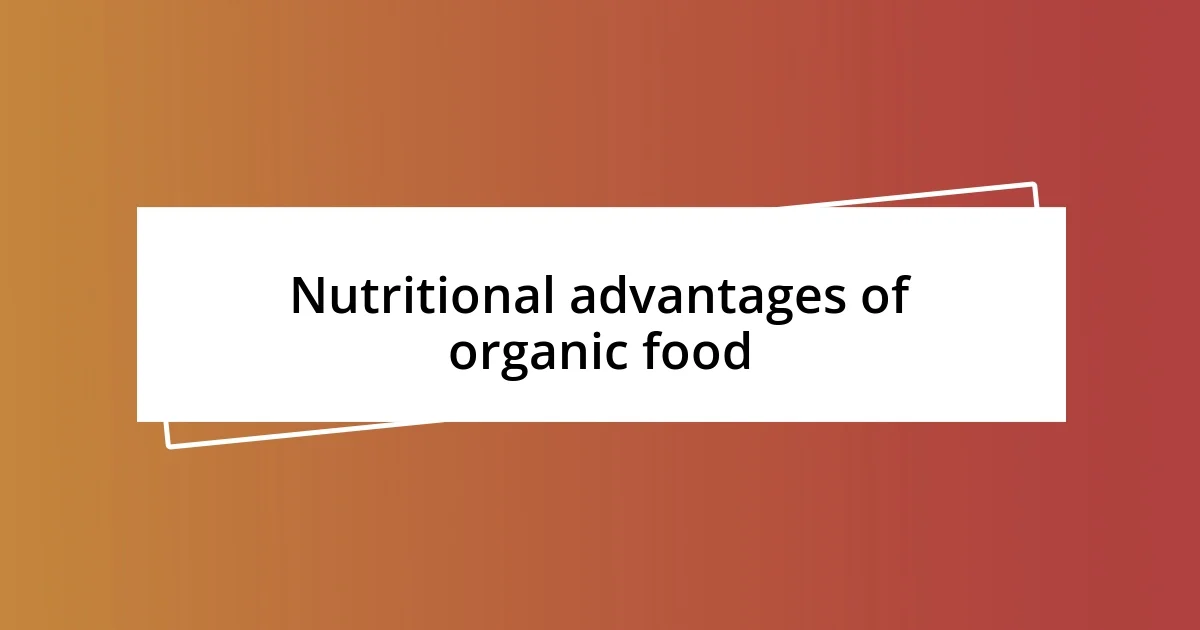
Nutritional advantages of organic food
The nutritional advantages of organic food are something I cherish. In my own experience, the energy I feel after eating organic produce is palpable. It’s not just about what’s on the label; I genuinely believe that the nutrient density in organic fruits and vegetables makes a difference. There’s a certain vibrancy to them that I can’t quite describe, almost as if they carry the essence of the earth within them.
Here are some key nutritional benefits of organic food:
- Higher Antioxidants: Research shows that organic produce often has higher levels of antioxidants, which can help combat free radicals in our bodies.
- Nutrient Concentration: Organic farming typically results in soil that is richer in nutrients, leading to produce that’s not only tastier but also more nutritious.
- Healthier Fats: When it comes to organic dairy and meats, I’ve found that they often contain more beneficial omega-3 fatty acids compared to conventional counterparts.
- Better for Your Gut: The lack of antibiotics and hormones in organic animal products contributes to a healthier gut microbiome, which is crucial for overall health.
- Minimized Glyphosate Exposure: Organic food is grown without synthetic herbicides like glyphosate, offering peace of mind that can enhance your overall well-being.
Choosing organic feels like choosing an option that nurtures not just my body but also my spirit. It’s a commitment to my health that has paid off time and time again.
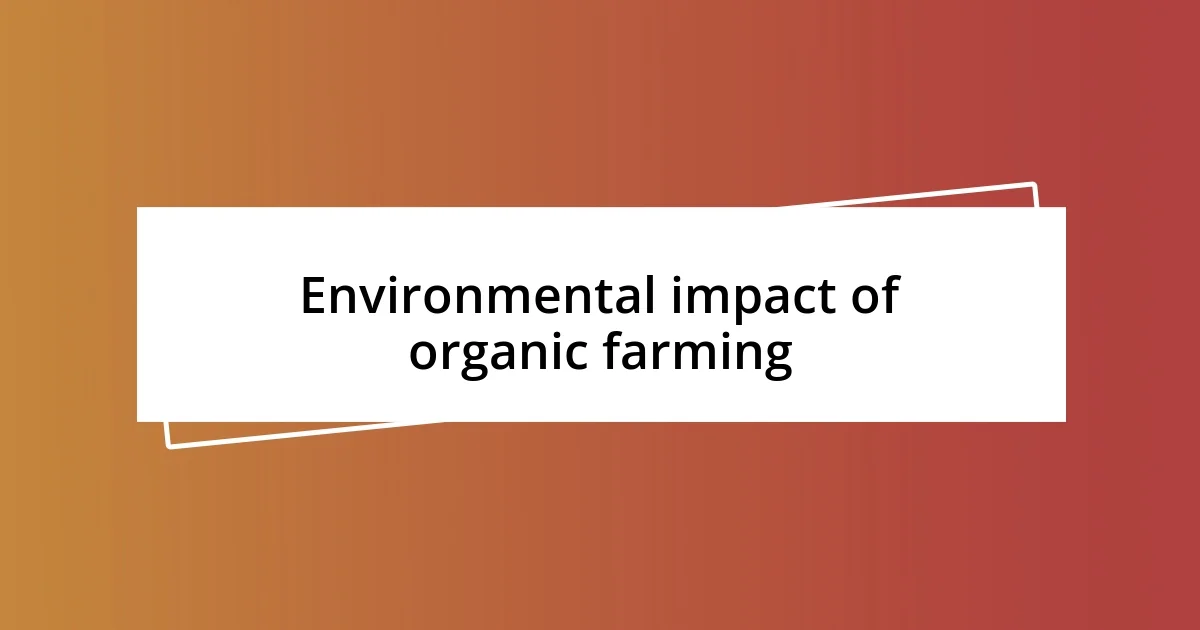
Environmental impact of organic farming
The environmental impact of organic farming is profound and far-reaching. From my experience, one of the most rewarding aspects of supporting organic practices is knowing they often enhance soil health. I recall volunteering on an organic farm where I felt the difference in the soil; it was rich, dark, and teeming with life. This healthy soil not only supports the plants but also helps in carbon sequestration, which is crucial for combating climate change.
Moreover, organic farming encourages biodiversity. It’s fascinating how diverse ecosystems thrive on these farms, benefiting a multitude of species, including pollinators like bees. I often think back to the time I spotted a vibrant array of butterflies fluttering around the garden, a sight that brought me immense joy. It made me appreciate how organic practices create habitats that support various life forms, ultimately enriching our environment.
Another significant environmental benefit is the reduction of water pollution. Organic methods eliminate harmful chemicals that can leach into waterways, preserving aquatic ecosystems. I once visited a riverbank that was revitalized after organic practices were adopted in nearby fields. The difference was striking; the water was clearer, and you could see fish thriving. This experience solidified my belief in supporting organic farming, knowing that my choices lead to a healthier planet.
| Aspect | Conventional Farming | Organic Farming |
|---|---|---|
| Soil Health | Poorer soil quality | Enhanced soil fertility and structure |
| Biodiversity | Reduced species variety | Supports diverse ecosystems |
| Water Quality | Contaminated waterways | Minimized chemical runoff |
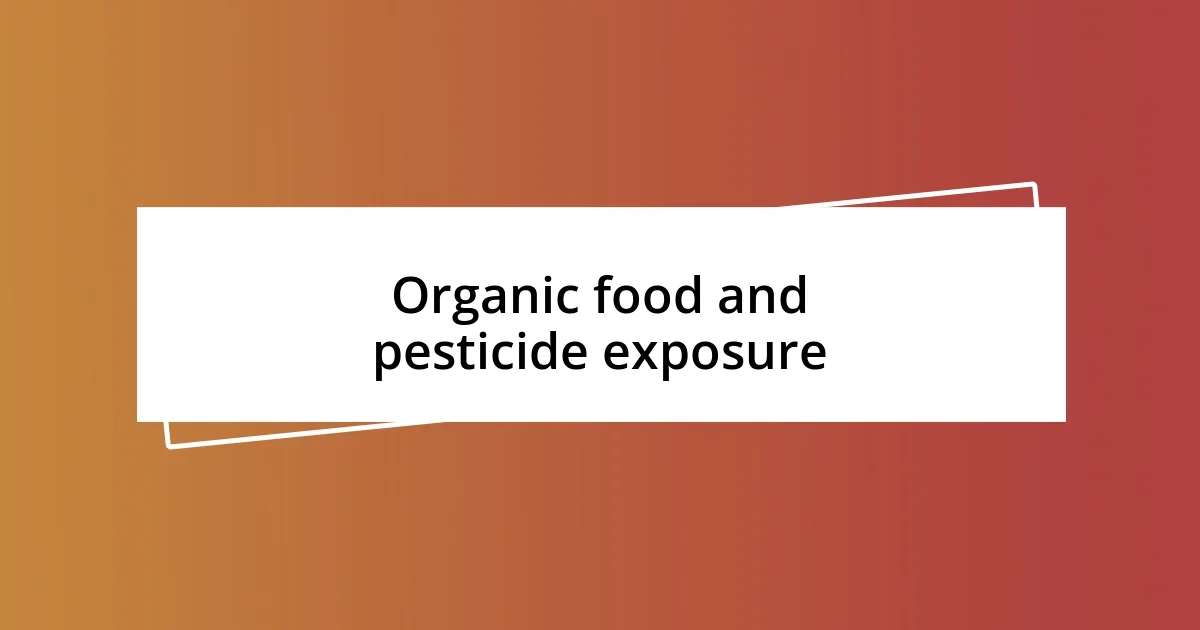
Organic food and pesticide exposure
I’m always fascinated by how organic food can reduce our pesticide exposure. When I first made the switch to organic, I instantly felt a sense of relief, knowing that I was minimizing my exposure to harmful chemicals. It’s shocking to think about the potential residues left behind by conventional farming practices, and it often leaves me wondering, what exactly am I putting into my body?
Moreover, I remember a particularly eye-opening moment at a local farmer’s market. I chatted with a farmer who proudly explained his organic methods, emphasizing that he was cultivating crops without synthetic pesticides. Hearing his passion made me appreciate the hard work behind organic farming. It’s not just about avoiding chemicals; it’s about a holistic approach to food production that respects our health and the environment.
In my view, the choice to opt for organic is an investment in both my health and my peace of mind. By consuming organic products, I’ve felt a deeper connection to my food, understanding that these choices lead to cleaner, safer eating experiences. Isn’t it reassuring to know that each bite contributes to a healthier lifestyle and a more sustainable world?
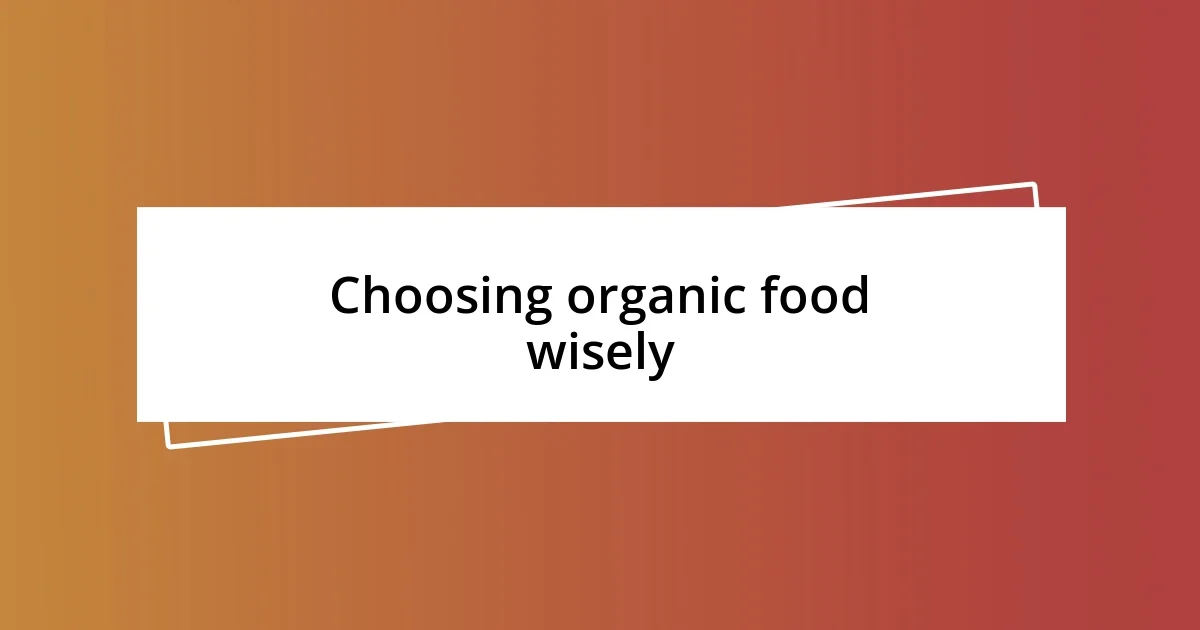
Choosing organic food wisely
When it comes to choosing organic food wisely, I’ve found that understanding labels is crucial. It can be overwhelming with all the certifications out there. I remember standing in the grocery aisle, staring at packages, wondering whether “100% organic” or “made with organic ingredients” truly makes a difference. I soon learned that the former guarantees a higher standard, which often spurred me to make more informed decisions during my shopping trips.
Another tip is to prioritize seasonal and local organic produce, which I’ve found to be not only fresher but also more flavorful. My experience at a local farm stand opened my eyes to just how vibrant and delicious fruits and vegetables can be when they’re picked at their peak. As I savored a juicy, sun-ripened tomato, I couldn’t help but appreciate the unique taste that comes from shorter supply chains. Isn’t it wonderful to know you’re supporting local farmers while enjoying the best nature has to offer?
Lastly, it’s essential to consider your budget when shopping for organic food. I recall feeling a bit overwhelmed by the prices at first. However, I discovered that buying in bulk or participating in a community-supported agriculture (CSA) program can make a big difference. It’s rewarding to share the cost with others and enjoy fresh, organic produce throughout the season. Have you ever thought about how small changes in your buying habits could lead to significant savings?
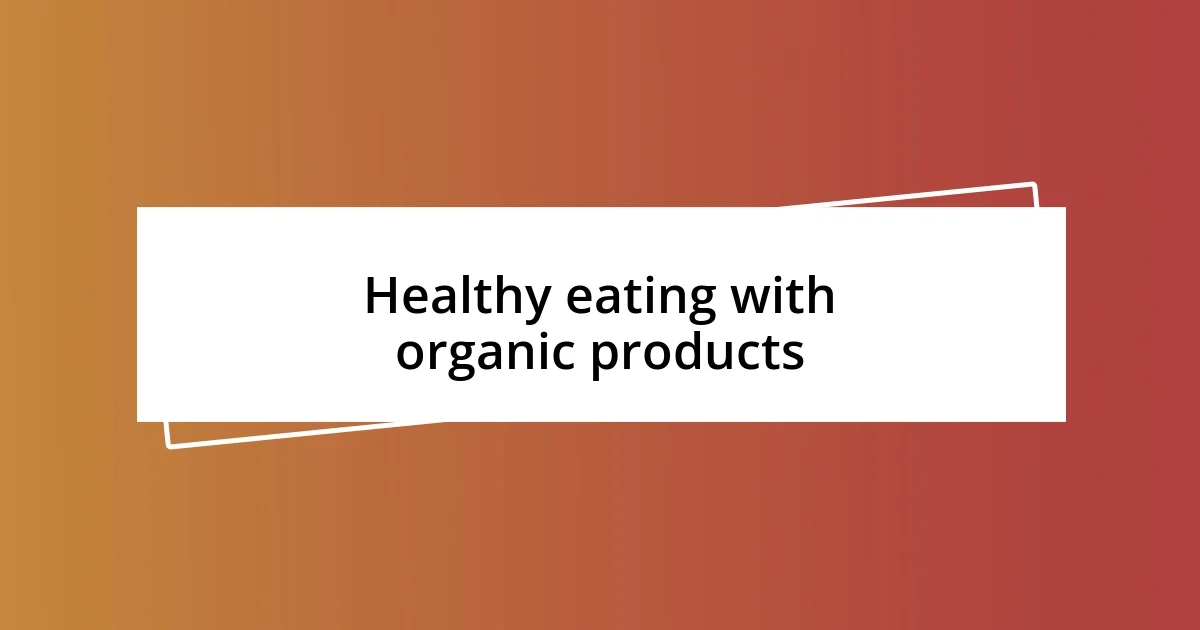
Healthy eating with organic products
Eating organic products has added a burst of freshness to my meals that I didn’t know I was missing. I remember a Saturday morning when I decided to whip up an organic breakfast. As I scrambled together some free-range eggs and organic spinach, the vibrant colors and rich flavors felt like a celebration of health on my plate. Have you ever noticed how the taste of fresh, organic ingredients can elevate even the simplest dishes into something extraordinary?
What truly resonates with me is how organic eating promotes not just personal health but also a deeper sense of community. Here’s an interesting moment: I volunteered at a community garden, and it was wonderful to see how organically grown foods bring people together. We shared stories as we harvested vegetables, united by our commitment to healthier living. It made me realize that when we choose organic, we’re also choosing to support local livelihoods and sustainable practices. Isn’t it heartwarming to think that our food choices can foster connections and inspire a collective commitment to better health?
I’ve also discovered that organic eating encourages mindfulness around food. One day, while savoring a bowl of organic berries, I found myself reflecting on the journey they took from farm to table. Knowing that they were produced without harmful chemicals made each bite feel like a gift. It was a moment of gratitude that reminded me of the importance of knowing where our food comes from. Have you ever experienced that sense of appreciation for the hard work that goes into nurturing healthy, organic options? It’s this awareness that makes eating organic not just a choice, but a part of a lifestyle rooted in health and respect for our environment.












